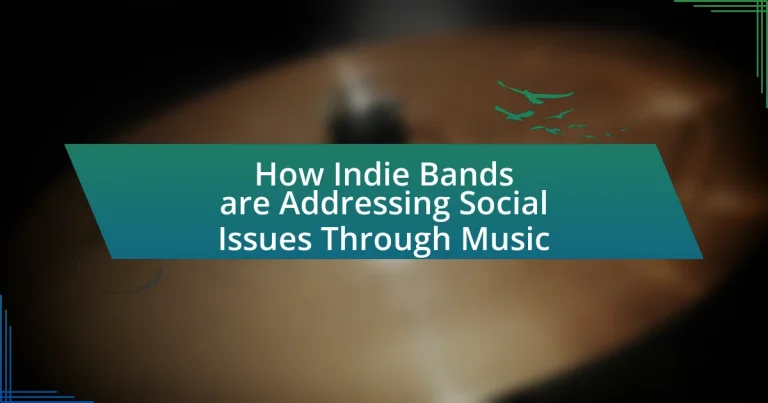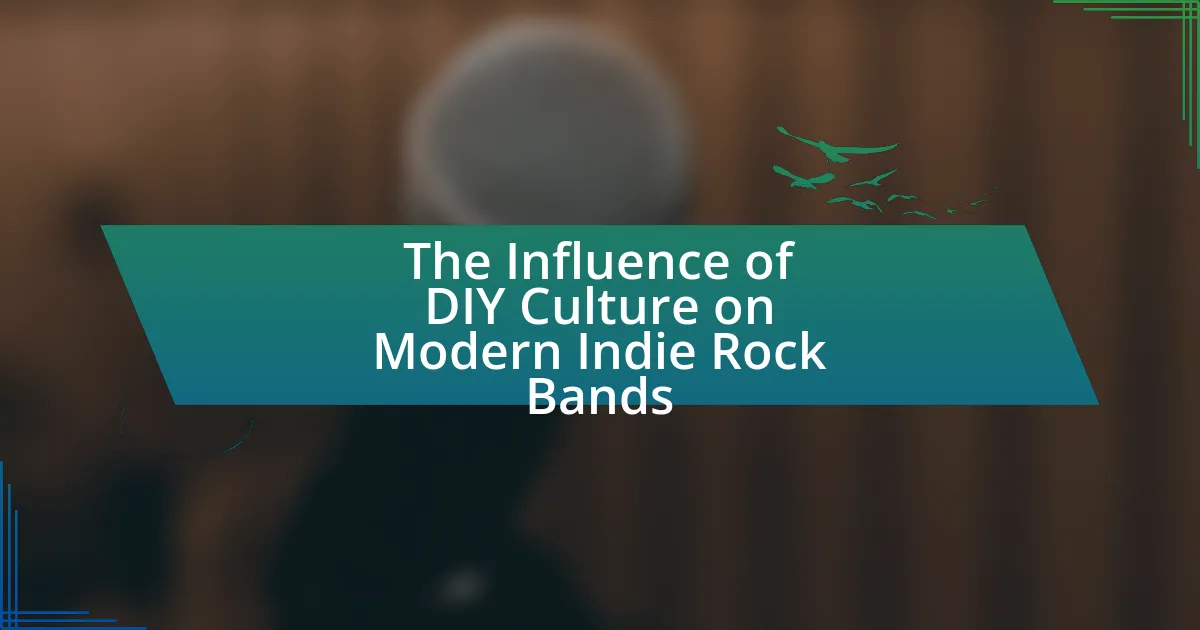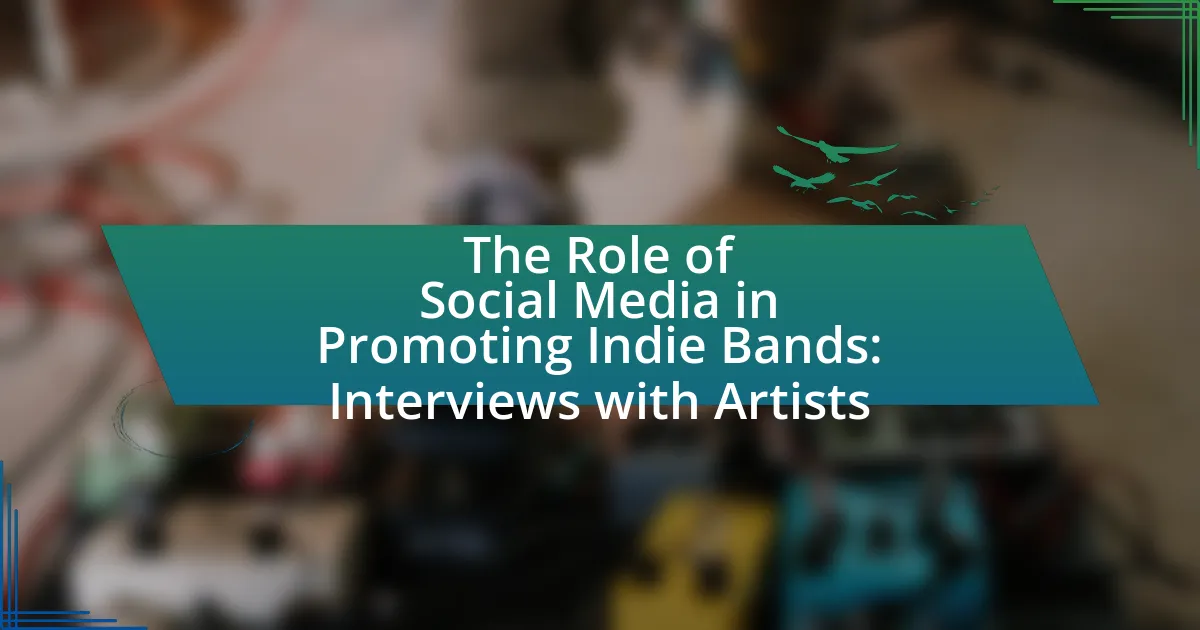Indie bands are increasingly using their music as a platform to address various social issues, including mental health, inequality, environmental concerns, and political activism. Through impactful lyrics and community engagement, these artists raise awareness and foster dialogue around pressing societal challenges. The article explores how indie musicians choose which issues to focus on, the emotional impact of their music, and the strategies they employ to connect with their audience. Additionally, it examines the challenges faced by indie bands in promoting social change, the role of storytelling in their music, and the potential consequences of their activism.
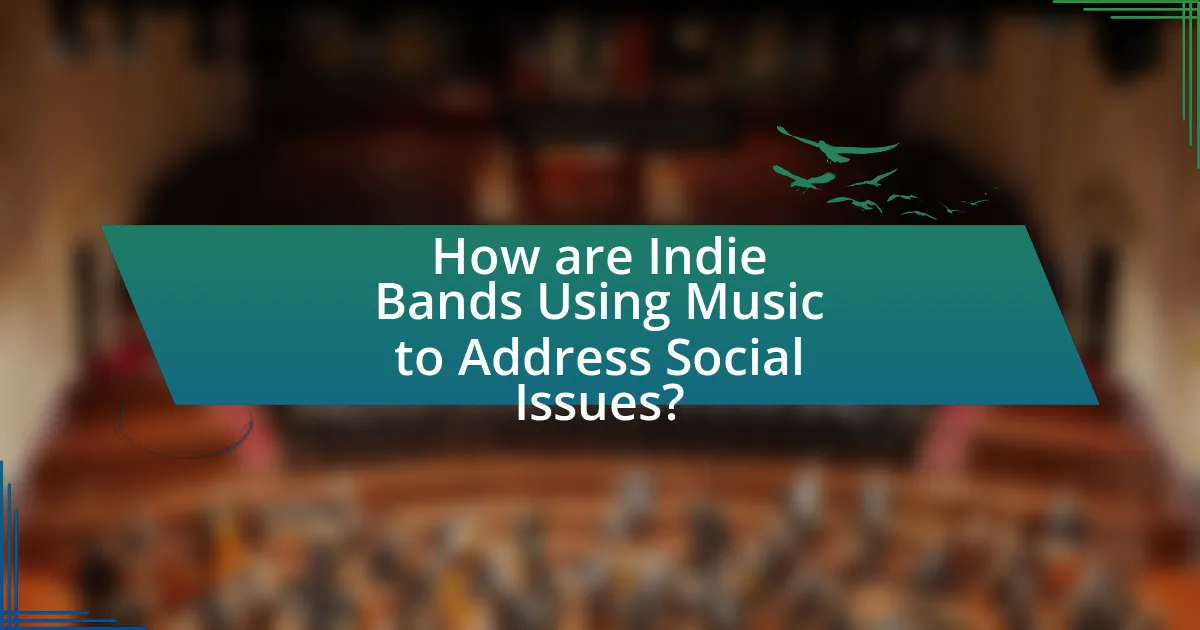
How are Indie Bands Using Music to Address Social Issues?
Indie bands are using music to address social issues by creating lyrics and themes that reflect societal challenges, such as inequality, mental health, and environmental concerns. For instance, bands like The 1975 have tackled issues like climate change and mental health awareness in their songs, raising public consciousness and encouraging dialogue. Additionally, many indie artists participate in benefit concerts and collaborate with non-profit organizations to amplify their messages, demonstrating a commitment to social change through their music. This approach not only engages their audience but also fosters a sense of community and activism among listeners, making music a powerful tool for social commentary and change.
What social issues are commonly addressed by indie bands?
Indie bands commonly address social issues such as mental health, inequality, environmental concerns, and political activism. For instance, many indie artists explore themes of mental health in their lyrics, reflecting the growing awareness and destigmatization of mental illness in society. Additionally, issues of social inequality, including race and gender disparities, are frequently highlighted, as seen in the works of bands like Vampire Weekend and their commentary on cultural appropriation. Environmental concerns are also prevalent, with bands like The 1975 advocating for climate action through their music and public statements. Political activism is another significant theme, with indie bands often using their platforms to address systemic injustices and encourage civic engagement, as demonstrated by artists participating in movements like Black Lives Matter.
How do indie bands choose which social issues to focus on?
Indie bands choose social issues to focus on based on personal experiences, community relevance, and cultural trends. These musicians often draw inspiration from their own lives, reflecting the struggles and injustices they encounter, which resonates with their audience. For instance, many indie bands address issues like mental health, environmental concerns, and social justice, as these topics are prevalent in contemporary society. Research indicates that artists who engage with social issues can foster a deeper connection with listeners, enhancing the emotional impact of their music. This connection is crucial for indie bands, as they often rely on grassroots support and community engagement to thrive.
What impact do these social issues have on the music created?
Social issues significantly influence the music created by indie bands, often serving as a catalyst for lyrical content and thematic exploration. For instance, many indie musicians address topics such as inequality, mental health, and environmental concerns, which resonate with their audiences and reflect societal realities. A study by the University of Southern California found that music with socially conscious themes can enhance listener engagement and foster community awareness, demonstrating that these issues not only shape the artistic expression but also impact the listener’s connection to the music.
Why is music an effective medium for addressing social issues?
Music is an effective medium for addressing social issues because it has the power to evoke emotions, foster connection, and inspire action among diverse audiences. The emotional resonance of music allows listeners to engage with complex social topics on a personal level, making abstract issues more relatable. For instance, songs like “Fight the Power” by Public Enemy have historically galvanized movements against racial injustice, demonstrating music’s role in social activism. Additionally, studies show that music can enhance empathy and understanding, as evidenced by research published in the journal “Psychology of Music,” which found that participants exposed to socially conscious music exhibited increased awareness of social issues. This combination of emotional impact and heightened awareness makes music a potent tool for social change.
How does music evoke emotional responses related to social issues?
Music evokes emotional responses related to social issues by using lyrical content, melodies, and rhythms that resonate with listeners’ experiences and feelings. For instance, songs addressing themes like inequality, injustice, or mental health can create a sense of empathy and awareness among audiences. Research indicates that music can activate brain regions associated with emotion, such as the amygdala, enhancing the emotional impact of social messages. A study published in the journal “Psychology of Music” by authors such as Grewe et al. (2007) found that music can elicit strong emotional reactions, which can lead to increased engagement with social issues. This emotional engagement often motivates listeners to reflect on and act upon the social issues presented in the music.
What role does storytelling play in indie music addressing social issues?
Storytelling in indie music serves as a powerful tool for addressing social issues by conveying personal narratives that resonate with listeners. Through lyrics that reflect real-life experiences, indie artists can highlight societal challenges such as inequality, mental health, and environmental concerns. For instance, songs like “Same Love” by Macklemore and Ryan Lewis use storytelling to advocate for LGBTQ+ rights, illustrating the struggles faced by marginalized communities. This narrative approach not only fosters empathy but also encourages dialogue around these critical topics, making the music a catalyst for social change.
In what ways do indie bands engage their audience on social issues?
Indie bands engage their audience on social issues primarily through their lyrics, social media activism, and community involvement. By incorporating themes of social justice, mental health, and environmental concerns into their songs, these bands raise awareness and provoke thought among listeners. For example, bands like The 1975 have addressed issues such as climate change and LGBTQ+ rights in their music and public statements. Additionally, indie bands often utilize social media platforms to share information, promote causes, and mobilize fans for activism, creating a direct line of communication with their audience. Furthermore, many indie bands participate in local events or charity concerts, fostering a sense of community and encouraging their fans to engage with social issues actively.
How do live performances contribute to raising awareness?
Live performances contribute to raising awareness by providing a platform for artists to communicate social issues directly to their audience. Through engaging performances, indie bands can highlight topics such as mental health, environmental concerns, and social justice, fostering a sense of community and shared purpose among attendees. For instance, events like benefit concerts have raised millions for various causes, demonstrating the tangible impact of live music on social awareness. Additionally, studies show that live music experiences can enhance emotional connections, making messages about social issues more resonant and memorable for audiences.
What strategies do indie bands use on social media to promote their messages?
Indie bands utilize various strategies on social media to effectively promote their messages, including engaging storytelling, interactive content, and targeted campaigns. Engaging storytelling allows bands to connect emotionally with their audience, sharing personal narratives or social issues that resonate with listeners. Interactive content, such as polls, Q&A sessions, and live streams, fosters community involvement and encourages fans to participate in discussions about the band’s messages. Targeted campaigns, often leveraging hashtags and collaborations with influencers, help indie bands reach specific demographics and amplify their social messages. These strategies are supported by data indicating that social media engagement can significantly increase audience reach and message retention, with platforms like Instagram and Twitter reporting higher engagement rates for posts that include interactive elements.
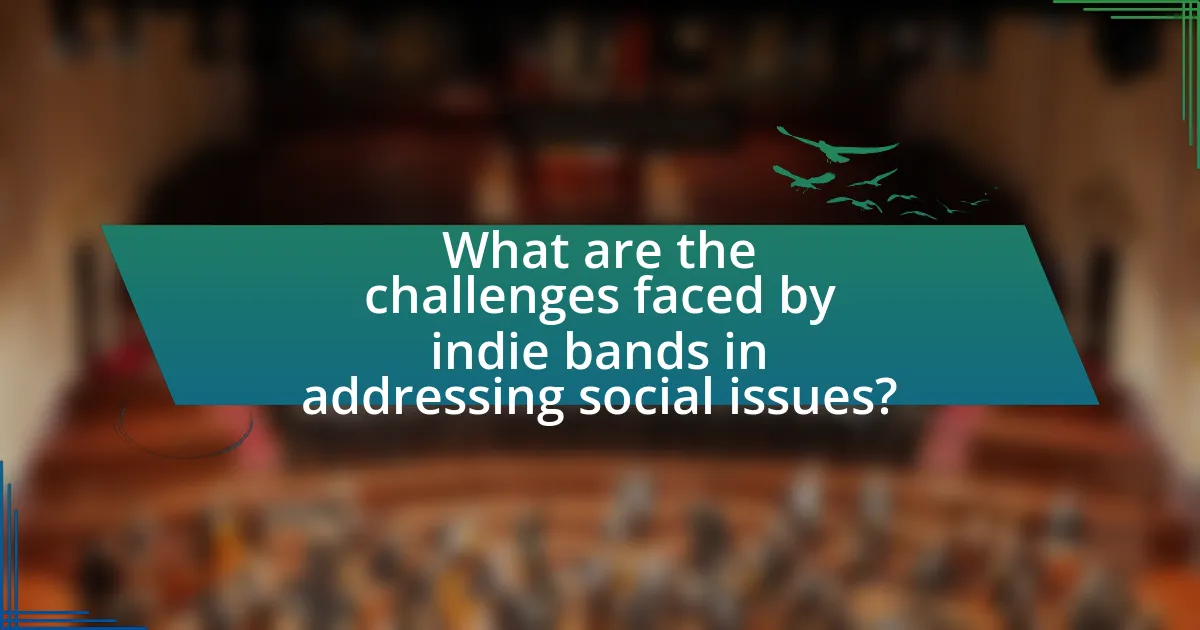
What are the challenges faced by indie bands in addressing social issues?
Indie bands face several challenges in addressing social issues, primarily due to limited resources, audience reach, and industry support. Limited financial backing restricts their ability to produce high-quality content that effectively communicates their message. Additionally, indie bands often struggle to gain visibility in a saturated music market, making it difficult to engage a broader audience on social issues. Furthermore, the lack of institutional support from record labels and media outlets can hinder their efforts to amplify their messages. According to a study by the University of Southern California, indie artists often rely on grassroots marketing, which can limit their impact compared to mainstream artists who have access to larger promotional budgets and platforms.
How do financial constraints affect their ability to address social issues?
Financial constraints significantly limit indie bands’ ability to address social issues through music. These financial limitations restrict their access to resources such as professional recording studios, marketing, and distribution channels, which are essential for amplifying their messages. For instance, a study by the Music Industry Research Association found that 70% of independent musicians reported financial barriers as a major obstacle in promoting social causes through their work. Consequently, without adequate funding, indie bands struggle to reach wider audiences and effectively engage in social advocacy, thereby diminishing their impact on the issues they aim to address.
What are the limitations of indie labels in promoting socially conscious music?
Indie labels face significant limitations in promoting socially conscious music primarily due to financial constraints. These labels often operate with smaller budgets compared to major labels, which restricts their ability to invest in marketing, distribution, and promotional activities necessary to reach wider audiences. For instance, a study by the Future of Music Coalition highlights that independent artists typically earn less from streaming services, limiting their financial resources for promotion. Additionally, indie labels may lack access to mainstream media channels and radio play, which are crucial for gaining visibility. This combination of limited funding and reduced media access hampers their effectiveness in promoting socially conscious messages to a broader public.
How does audience reception impact the message of their music?
Audience reception significantly impacts the message of indie bands’ music by shaping the interpretation and emotional resonance of their lyrics and themes. When audiences connect with the social issues presented in the music, such as inequality or mental health, their feedback can influence the band’s future work, prompting them to explore these themes more deeply or shift their focus based on listener engagement. For instance, studies have shown that music that resonates with listeners’ personal experiences can lead to increased advocacy and awareness around the issues addressed, demonstrating that audience reception not only validates the band’s message but can also amplify its societal impact.
What risks do indie bands take when addressing controversial social issues?
Indie bands face significant risks when addressing controversial social issues, including potential backlash from audiences, loss of commercial opportunities, and damage to their reputation. When bands take a stand on divisive topics, they may alienate segments of their fan base, leading to decreased ticket sales and streaming numbers. For instance, a study by the University of Southern California found that artists who engage in political discourse can experience a 20% drop in audience engagement if their views conflict with those of their listeners. Additionally, brands may hesitate to partner with indie bands that are outspoken on controversial issues, limiting their financial support and promotional opportunities. This can hinder the band’s growth and sustainability in a competitive music industry.
How can backlash from audiences or critics affect their careers?
Backlash from audiences or critics can significantly hinder the careers of indie bands by damaging their reputation and limiting their marketability. When a band faces negative reactions, it can lead to decreased ticket sales, reduced streaming numbers, and loss of sponsorship opportunities. For instance, a study by the University of Southern California found that artists who receive negative press often experience a 30% drop in album sales within the first month following the backlash. This decline can create a cycle where the band struggles to regain their audience’s trust, ultimately affecting their ability to produce and promote new music.
What are the potential consequences of political activism in music?
Political activism in music can lead to significant social change, increased awareness of issues, and potential backlash against artists. When musicians use their platform to address social issues, they can mobilize audiences, inspire movements, and influence public opinion, as seen in the impact of songs like “Fight the Power” by Public Enemy, which became an anthem for social justice. However, this activism can also result in negative consequences, such as alienation of certain fan bases or censorship from media outlets, exemplified by the backlash faced by artists like Dixie Chicks after their anti-war statements. Thus, while political activism in music can drive positive change, it also carries risks that artists must navigate.
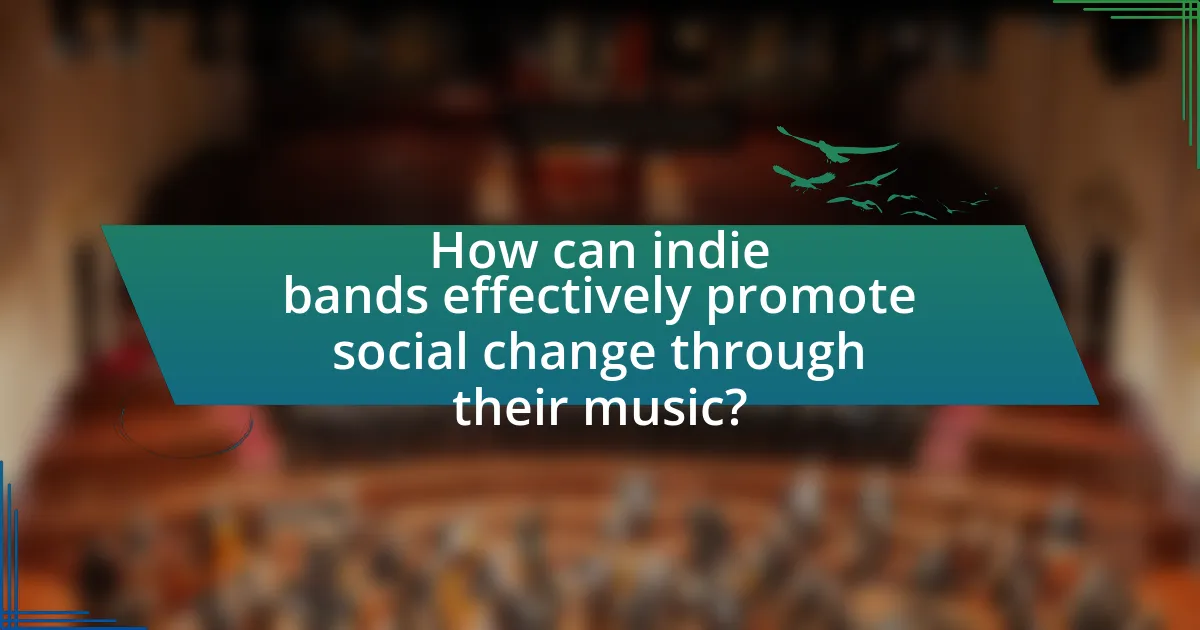
How can indie bands effectively promote social change through their music?
Indie bands can effectively promote social change through their music by addressing relevant social issues in their lyrics and engaging with their audience on these topics. By creating songs that reflect societal challenges, such as inequality, mental health, or environmental concerns, indie bands can raise awareness and inspire action among listeners. For instance, the band “Rage Against the Machine” has historically used their platform to discuss political and social injustices, influencing public discourse and activism. Additionally, indie bands can collaborate with organizations that focus on social change, using their music to support campaigns and fundraisers, thereby amplifying their impact. This approach not only fosters a sense of community but also encourages fans to participate in social movements, demonstrating the power of music as a catalyst for change.
What collaborative efforts can enhance the impact of their messages?
Collaborative efforts that can enhance the impact of indie bands’ messages include partnerships with social organizations, joint performances with other artists, and community engagement initiatives. By collaborating with social organizations, indie bands can align their music with specific causes, amplifying their messages through established networks. Joint performances with other artists can create a larger platform, attracting diverse audiences and fostering a sense of unity around social issues. Community engagement initiatives, such as workshops or local events, allow bands to connect directly with their audience, making their messages more relatable and actionable. These strategies have been shown to increase awareness and drive social change, as evidenced by initiatives like the “Music for Change” campaign, which successfully raised funds and awareness for various social issues through collaborative concerts.
How can partnerships with non-profits amplify their social messages?
Partnerships with non-profits can amplify their social messages by leveraging the non-profits’ established networks and resources to reach broader audiences. For instance, when indie bands collaborate with non-profits, they can utilize their music platforms to promote the non-profits’ causes, thereby increasing visibility and engagement. A study by the National Endowment for the Arts found that music can effectively raise awareness about social issues, as it resonates emotionally with listeners, making them more likely to support the cause. Additionally, joint campaigns can create a synergistic effect, where the combined efforts of the band and the non-profit lead to greater impact than either could achieve alone.
What role do festivals and events play in promoting social issues?
Festivals and events serve as powerful platforms for promoting social issues by raising awareness, fostering community engagement, and encouraging dialogue. These gatherings often feature performances, discussions, and activities centered around specific social causes, effectively mobilizing audiences to take action. For instance, events like the Coachella Valley Music and Arts Festival have included initiatives addressing environmental sustainability and mental health awareness, demonstrating their capacity to influence public perception and inspire change. Additionally, research indicates that participation in such events can enhance social cohesion and collective identity, further amplifying the impact of the social messages conveyed.
What best practices should indie bands follow to maximize their impact?
Indie bands should focus on authentic storytelling and community engagement to maximize their impact. Authentic storytelling allows bands to connect deeply with their audience by sharing personal experiences and social issues that resonate with listeners. For instance, bands like The Lumineers have effectively used their lyrics to address themes of struggle and resilience, which has fostered a loyal fan base. Community engagement, such as participating in local events or collaborating with social causes, enhances visibility and strengthens connections with fans. Research indicates that 70% of consumers prefer brands that support social causes, highlighting the importance of aligning music with meaningful messages. By prioritizing these practices, indie bands can create a lasting impact both musically and socially.
How can they create authentic connections with their audience?
Indie bands can create authentic connections with their audience by sharing personal stories and experiences that resonate with listeners. This approach fosters relatability and emotional engagement, as audiences often seek music that reflects their own struggles and triumphs. For instance, a study by the University of Southern California found that music with personal narratives can enhance listener empathy and connection, demonstrating that authenticity in lyrics and themes can significantly strengthen the bond between artists and their fans.
What are effective ways to integrate activism into their music and branding?
Indie bands can effectively integrate activism into their music and branding by embedding social messages in their lyrics, collaborating with activist organizations, and utilizing their platforms for awareness campaigns. For instance, bands like Rise Against have incorporated themes of social justice and environmentalism in their songs, which resonate with their audience and promote activism. Additionally, partnerships with organizations such as Greenpeace or Amnesty International can amplify their message, as seen with artists who donate a portion of their proceeds to these causes. Furthermore, leveraging social media to engage fans in discussions about social issues can create a community around their activism, enhancing both their brand identity and impact.
What resources are available for indie bands addressing social issues?
Indie bands addressing social issues can access various resources, including nonprofit organizations, grants, and online platforms dedicated to social activism. Nonprofit organizations like Music for Change and the Music Foundation provide funding and support for projects that align with social causes. Additionally, grants from entities such as the National Endowment for the Arts can help finance music projects focused on social issues. Online platforms like Bandcamp and SoundCloud allow indie bands to share their music widely, raising awareness and funds for their causes. These resources enable indie bands to effectively engage with social issues through their music.
How can they access funding or grants for socially conscious projects?
Indie bands can access funding or grants for socially conscious projects by applying to various organizations that support arts and social initiatives. Numerous foundations, such as the National Endowment for the Arts and local arts councils, offer grants specifically for projects that address social issues through music. For example, the Creative Capital Foundation provides funding for innovative projects that engage with social change. Additionally, crowdfunding platforms like Kickstarter and Indiegogo allow indie bands to raise funds directly from supporters who resonate with their mission. These avenues not only provide financial support but also help build a community around the band’s socially conscious efforts.
What platforms exist for sharing their messages and music widely?
Indie bands can share their messages and music widely through platforms such as Spotify, SoundCloud, Bandcamp, YouTube, and social media networks like Instagram and Facebook. These platforms allow artists to reach global audiences, with Spotify boasting over 400 million users and SoundCloud hosting millions of tracks, facilitating easy access to music and messages. Additionally, YouTube serves as a powerful medium for visual storytelling, with over 2 billion logged-in monthly users, enabling bands to convey their social messages through music videos and performances. Social media platforms enhance engagement and community building, allowing indie bands to connect directly with fans and promote their causes effectively.
